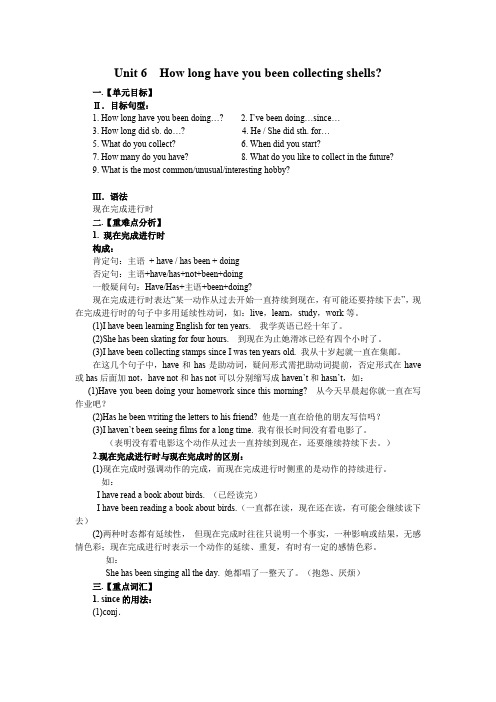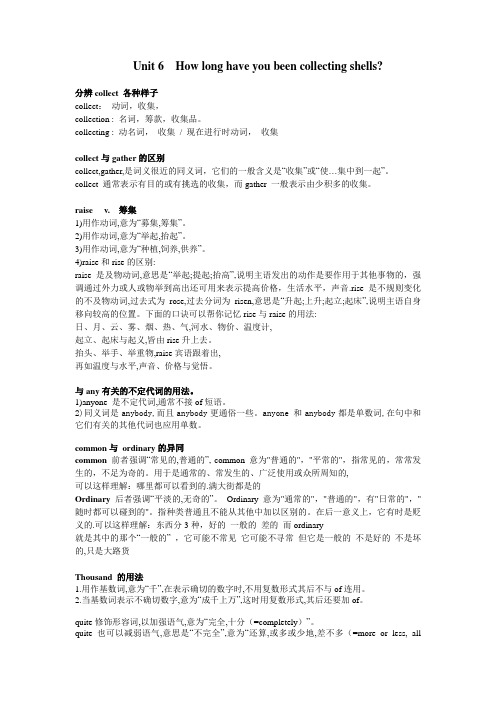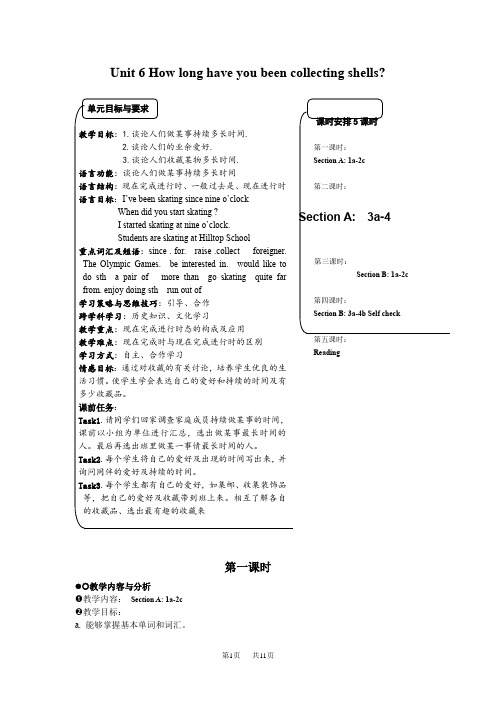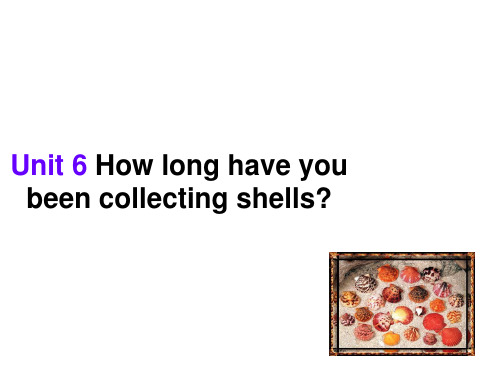Unit6Howlonghaveyoubeencollectingshells-整合教案
Unit6Howlonghaveyoubeencollectingshell

Unit 6 How long have you been collecting shell ?孙风梅Teaching goals:1.Words and expressions in this unit .2.How to use the present Perfect Progressive Tense.3.Patterns: How long have you been doing sth ?I have been doing sth since … .I have been doing sth for … (period of time) .4.Talk about how long you have been doing things.5.Talk about person’s hobbies.Important and difficult points:1.Words and expression in this unit .2.The differences between the three tenses:the Present Perfect Progressive Tense,the Simple Past Tense, the Present Progressive Tense.Teaching aids: teaching cards , pictures , a tape recorder .Unit6 How long have you been collecting shells? Period 1一、Knowledge Objects:(1)Key vocabulary: inline skating; marathon; skate; shell; collect(2)Key structures: —How long have you been skating?—I’ve been skating for five hours.(3)Listening practice二、Ability Object:1.To train students’ ability of listening and speaking.2.Teaching Key Points : Key vocabulary. Key structures. Listening practice.三、Teaching Difficulties: How to improve students’ listening ability.四、Pairwork.:五、Blackboard Design:Unit 6 How long have you been collecting shells?A: How long has Alison been skating? B: She’s been skating for five hours.A: How long did Sam skate? B: He skated for four hours.六、Teaching Procedures:Step ⅠGreet the class and check the homework.Step ⅡShow the new words on the screen. Teach the new words. Read the new words to students and ask students to repeat.Step ⅢSection A Draw a long horizontal line across the board. Say, This is called a time line. It shows the years from 19- to the present. Let’s put some information about ourselves on the time line.T: Maria, when did you start studying English? S1:1997.T: Maria started studying English in 1997.(Write the words Maria started English above the date 1997 on the time line.)In this unit we’re going to talk about how long we’ve been doing things. Maria, how long have you been studying English?(Point to the date 1997 on the time line.)S1:Since 1997.T:(Look at the class.)Correct. Maria has been studying English since 1997.(Point to the starting date and run the finger along the years up to the present year.)Class repeat. Maria has been studying English since 1997.Ss: Maria has been studying English since 1997.Repeat the activity using different dates for several other students. Use a different situation, such as When did you start to ride a bicycle? or When did you start to baby-sit? if these questions are more appropriate. Each time ask the class to repeat a sentence, point to the starting date and run the finger along the years up to the present year.Step Ⅳ1aThis activity provides oral practice using the target language.Go through the instructions with the class. Say, You will be talking with other students about some things you did in the last 24 hours.Write the words at and for on the blackboard. Say, You will be using the words at and for in some answers.Divide the students into some groups. Let students look at the three questions and read them to the class.(1)How long did you sleep last night? (2)When did you start class today?(3)How long have you been in class today?Then get students to ask and answer these questions in groups. Let them look at the words at and for on the blackboard. Say, Use the two words in sentences like this: I started class at 10:00.I slept for ten hours.While students work in groups, move around the room checking their progress and offering help as needed.Ask the class each question and let several different students answer. Help the students phrase responses using the words at and for correctly.Step Ⅴ1bThis activity gives students practice in understanding the target language in spoken conversation.First tell students, We’re going to listen to a recording of a reporter talking to the participants in an inline skating marathon.Let students look at the picture and tell what is happening. Help the students understand that the students in the picture are at a skating marathon. Then discuss with students what a marathon is.(It’s a contest to see who can do something—run or dance or skate—the longest without stopping.)Ask a student to read the instructions, and the name in the chart. Then say, You will write sentences about these people according to the recording.Get a student to read the sample answers.I’ve been skating for five hours. I skated for four hours.T: What word comes before the number of hours?S: For.T: That’s right. We use the word for when we talk about a number of hours. We say for five hours or for ten days.Play the recording for the first time. This time students only listen. When play it a second time, say, This time listen to the tape carefully and write the sentences in the chart.Correct the answers.AnswersAlison: I’ve been skating for five hours.Sam: I skated for four hours.Victor: I’ve been skating for five hours.Celia: I skated for two hours.Step Ⅵ1c PairworkThis activity provides guided speaking and listening practice using the target language.Ask a student to read the instructions aloud. And let students look at the picture in Activity 1a.Have two students read the example in sample dialogue in Activity 1c.Then say, Now work with your partner. Begin with reading the conversation in the box with your partner. Then make a conversation about the people in the picture. You can use the names and sentences in Activity 1b.Are you clear? OK. Begin, please.As students work, move around the room, checking their progress. Offer language support if necessary.At the end ask several pairs of students to say their conversations to the class. Give them little presents if they do their work better.Step ⅦOptional ActivityWrite these words on the board in random order: how, long, have, you, been, studying, English, going to school, playing soccer, riding a bicycle. Then give a student a pointer and ask him or her to tap the words one by one to make a question. For example the student might tap these words: how...long...have...you...been...riding...a...bicycle. Then the student calls on another student to answer the question. Give several students a chance to tap out questions. Step ⅧSummary and HomeworkToday we’ve learned some key vocabulary and structures. Continue to make conversations with your partner after class. Next time I’ll ask some pairs to read your conversations to the class again.Step Ⅸ:comments after class.(The End)。
新版八年级英语上册知识点Unit_6How long have you been collecting shells

Unit 6How long have you been collecting shells?一.【单元目标】Ⅱ.目标句型:1. How long have you been doing…?2. I’ve been doing…since…3. How long did sb. do…?4. He / She did sth. for…5. What do you collect?6. When did you start?7. How many do you have?8. What do you like to collect in the future?9. What is the most common/unusual/interesting hobby?Ⅲ.语法现在完成进行时二.【重难点分析】1. 现在完成进行时构成:肯定句:主语+ have / has been + doing否定句:主语+have/has+not+been+doing一般疑问句:Have/Has+主语+been+doing?现在完成进行时表达“某一动作从过去开始一直持续到现在,有可能还要持续下去”,现在完成进行时的句子中多用延续性动词,如:live,learn,study,work等。
(1)I have been learning English for ten years. 我学英语已经十年了。
(2)She has been skating for four hours. 到现在为止她滑冰已经有四个小时了。
(3)I have been collecting stamps since I was ten years old. 我从十岁起就一直在集邮。
在这几个句子中,have和has是助动词,疑问形式需把助动词提前,否定形式在have 或has后面加not,have not和has not可以分别缩写成haven’t和hasn’t,如:(1)Have you been doing your homework since this morning? 从今天早晨起你就一直在写作业吧?(2)Has he been writing the letters to his friend? 他是一直在给他的朋友写信吗?(3)I haven’t been seeing films for a long time. 我有很长时间没有看电影了。
Unit 6How long have you been collecting shells

Unit 6How long have you been collecting shells?分辨collect 各种样子collect:动词,收集,collection : 名词,筹款,收集品。
collecting : 动名词,收集/ 现在进行时动词,收集collect与gather的区别collect,gather,是词义很近的同义词,它们的一般含义是“收集”或“使…集中到一起”。
collect 通常表示有目的或有挑选的收集,而gather 一般表示由少积多的收集。
raise v. 筹集1)用作动词,意为“募集,筹集”。
2)用作动词,意为“举起,抬起”。
3)用作动词,意为“种植,饲养,供养”。
4)raise和rise的区别:raise 是及物动词,意思是“举起;提起;抬高”,说明主语发出的动作是要作用于其他事物的,强调通过外力或人或物举到高出还可用来表示提高价格,生活水平,声音.rise 是不规则变化的不及物动词,过去式为rose,过去分词为risen,意思是“升起;上升;起立;起床”,说明主语自身移向较高的位置。
下面的口诀可以帮你记忆rise与raise的用法:日、月、云、雾、烟、热、气,河水、物价、温度计,起立、起床与起义,皆由rise升上去。
抬头、举手、举重物,raise宾语跟着出,再如温度与水平,声音、价格与觉悟。
与any有关的不定代词的用法。
1)anyone 是不定代词,通常不接of短语。
2)同义词是anybody,而且anybody更通俗一些。
anyone 和anybody都是单数词,在句中和它们有关的其他代词也应用单数。
common与ordinary的异同common 前者强调“常见的,普通的”, common 意为"普通的","平常的",指常见的,常常发生的,不足为奇的。
用于是通常的、常发生的、广泛使用或众所周知的,可以这样理解:哪里都可以看到的.满大街都是的Ordinary 后者强调“平淡的,无奇的”。
八年级英语下册 unit6 How long have you been collecting sh

八年级英语下unit6 How long have you been collectingshells? (period 1)教材分析:在课改的背景下,本套教材避免了传统课程的缺点,强调了学生的兴趣、经验等,能结合实际,贴近生活,插图生动活泼,重视了学生的情感。
本节课U nit 6, Book IV, the topic is“ How long have you been collecting she lls?”第一课时是一堂以听说课为主的课,本课是该项语法教学的第一课,要对学生进行正确的语言输入,为以后的教学打下坚实的基础。
现在完成时与现在完成进行时的区别不易理解,因而如何运用现在完成进行时也为难点和关键点。
主要谈论人们做某事持续多长时间,以及人们的业余爱好,培养健康的爱好。
我强调英语课程要从学生的学习兴趣、生活经验和认知水平出发,倡导自主、实践、参与、合作与交流的学习方式和任务型的教学途径,发展学生的综合语言运用能力。
学生分析:我校学生生源由城乡两部分结合构成,学生的整体英语水平一般,英语交际的能力比较弱。
但本单元的教学是在学习了第九单元“现在完成时”的基础上教学,来学习“现在完成进行时”,这对学生理解时态方面水到渠成,但需要合理的引导。
而且学生的思维活跃,有参与意识,所以只要教学设计有一定的梯度,给学生打起台阶,一旦会表达,就非常喜欢表达自己的思想, 能够主动的配合老师,愿意开口讲。
设计理念:1、以听说训练为主线,通过看、听、说、演练、动手练等一系列教学活动,使学生获得最基本的英语听说能力,并在教学中充分激发学生强烈的学习愿望,在注重学生知识能力发展的同时,特别强调学生人格的发展和思维的发展。
2、通过各种各样的教学活动,如:记忆力挑战、教师个人的资料、学生喜欢的成龙的信息、表演对话、回答问题、讨论等形式,努力倡导学生积极参与,让学生在学习过程中不仅能建构知识,提高语言能力,而且通过感知、体验、实践、参与和合作探究等方式完成任务和实现目标。
Unit 6 How long have you been collection shells

Unit 6 How long have you been collecting shells?第一课时●教学内容与分析❶教学内容:Section A: 1a-2c❷教学目标:a. 能够掌握基本单词和词汇。
第五课时:Readingb.能够运用基本句型进行提问。
学习任务:我的爱好目的:通过学生小组活动,调查彼此的爱好及持续的时间。
学会使用for 和 since表达自己的爱好持续的时间,培养学生应用英语进行交际的能力。
语言技能:listening .speaking .reading and writing语言知识:现在完成进行时的用法及复习一般过去时提示词语及句型:skate, collect, What’s your hobby? I like…How long have you been skating?I have been skating since nine o’clock/for five years.How long did you……? When did you ……●教学重点、难点分析:❶教学重点:基本单词,词汇和句型❷教学难点:能够运用现在完成进行时谈论自己的爱好及持续时间●课前准备❶本课时的教学课件●教学设计教学步骤建议和说明↘热身/复习(Warm-up/Revision)❶ Greetings.❷ Talk with students about the following:1.Did you sleep well last night?2.How long did you sleep last night ?3.When did you start class today ?4.How long have you been in class today?Help the students to answer: I have been in class for…↘呈现/操练(Presentation/Practice)❶Draw a long horizontal line on the blackboard. Say, This is called a time line. It shows the years from 19-to the present. Let’s put some information about ourselves on the time line.T: Maria, when did you start studying English?S1: .T: Maria started studying English in .(Write the words Maria started English above the date on the time line.)Maria has been studying English since . (class repeat)❷Repeat the activity using different dates for several other students. Use a different situation, such as When did you start to ride a bicycle? or When did you start to baby-sit? if these questions are more appropriate. Each time ask the class to repeat a sentence, point to the starting date and run the finger along the years up to the present year.❸学生两人一组问答从平常的谈话中轻松导入本课句型,信息沟使谈话非常真实,而又浅显易懂。
八年级英语下册Unit6Howlonghaveyoubeencollectingshellsperi

since he came to China?
说什么?
③Did the writer think it was hard to understand Chinese history?
学习内容与方法
知识宝库
文档来源为:从网络收集整理.word 版本可编辑.欢迎下载支持.
4.Go through 3a on P50 and try to understand the following 4.by the way 意思为“顺
I have run out of ink.
②我们用完了所有空间来贮藏他们?
我墨水用完了。 My ink is running out. 我墨水快用完了。 ◆use up 用完(与 run out of 同义 2.room 作不可数名词时,意 思为“空间,地方”,相当 于 space。 make room for sb 给某人 让地方。
sen- tences.浏览 P50 短文,弄明白下列句子的意思。★ ①---the more I learn about Chinese history,the more I
enjoy living in China. ②In fact,the first jews probably came to Kaifeng more than
③如果你认识其他任何收藏邮票的人,请告诉我。 ④我开设一个雪球收集者俱乐部。 ⑤我的爱好是打篮球。 2.Warming-up.热身练习。(通过自主学习,你能熟练读出 P50~ 51 的生词,并知晓它们的汉语意思吗?△ Step 2 Self-study. 自学&交流讨论。 1.Preview the materials in p50 and translate the following phrases. 预习 p50 的材料,并就下列短语英汉互译。△ 欧洲的影响 俄罗斯的风格 一千多年前
Unit_6_How_long_have_you_been_collecting_shells_课件

1985. since 26 years ago.
she was 5 years old.
周杰伦 (Jay Chou)
be born: 1979 sing: 2000~ now
How long has Jay been singing? He has been singing for 11 years.
How long has she been reading?
for +一段时间
She has been reading for 2 hours. since 7:00. since+时间点 2 hours ago.
自从...以来 一段时间+ ago
She likes reading. She started reading at 7:00. Now it is 9:00.
since 1961. 50 years ago. he was 7 years old.
郭晶晶 (Guo Jingjing)
be born: 1981 dive (跳水):1985 ~ now
How long has Guo Jingjing been diving?
She has been diving for 26 years.
5. A:他游泳有多长时间了? B: 他已游了半小时了。 A: How long __h_a_s___ he _b_e_e_n__ _s_w_i_m_m__in_g? B: He _h__a_s__ b__e_e_n___ s_w__im__m_i_ng___f_o_r__ half an hour.
How long has he been teaching?
He has been teaching for 30 years.
Unit 6 How long have you been collecting shells精心挑选版

Unit 6 How long have you been collecting shells? 第一卷:I. 单项选择()1. -When did you get your first pair of skates?-_______.A. For 6 yearsB. Since I was 7 years old.C. When I was 7 years old.D. Since 6 years ago.()2. He raised ______ for the charity to help the poor children.A. thousand of dollarsB. thousand of dollarC. thousands of dollarsD. thousands of dollar()3. -______ does the first class begin? -At 7:40.A. How longB. WhereC. WhenD. How()4. Mr. Smith _______ here for about two hours.A. has leftB. left fromC. went away fromD. has been away from()5. _____ of them has an English dictionary.A. EveryB. All . Both D. Each()6. ______ is really hard _______ them to climb up the mountain at night.A. This, toB. It, forC. This, forD. It, to()7. Signs can been seen on the road. _______ can people see them?A. Where else placeB. Where place elseC. Where elseD. Anywhere()8. -Who cleaned the blackboard yesterday, Dick? -John ______.A. cleanedB. doesC. didD. is ()9. Do you know _______ over there?A. What happensB. What was happenedC. What is happeningD. What did happen()10. I’m waiting for my friend. If he _______, I will go swimming alone.A. doesn’t comeB. won’t comeC. will comeD. is comingII. 完型填空Linda has brought all her books home today. After lunch she puts the 1 out on the table and begins to do the homework for each subject. She begins with math. She finds that she has no 2 . She looks for it everywhere, but doesn’t find it. After a little while, she doesn’t feel comfortable 3 . She moves to the sofa with all her books. Now the sunlight from the window shines 4 . She moves back to the table. She has made a good start on her 5 when she stops to listen to her mother talking on the telephone. When she comes back to her work, her little sister Betty asks her for some 6 . Betty joins her at the table and begins to draw a horse. Linda has to 7 her. When they have finished, both go to the 8 . Linda eats some cakes there and brings a tin Coca Cola to her table. She says to herself, “I’ll finish my English exercises 9 at school before classes start ” Then she starts to review her history lesson, but she feels 10 . She doesn’t know what she is reading. She closes her books and goes to bed.1. A. balls B. books C. toys D. pictures2. A. cake B. water C. ruler D. bag3. A. on the floor B. near the window C. on the table D. in the chair4. A. on the door B. on the walls C. on her feet D. in her eyes5. A. English B. Chinese C. history D. math6. A. money B. paper C. sweets D. apples7. A. pull B. help C. listen to D. write to8. A. bedroom B. bathroom C. classroom D. kitchen9. A. today B. tomorrow C. this evening D. this afternoon10. A. cold B. sorry C. tired D. hungryIII. 阅读理解(一)The word hobby is an interesting word. Every person has one thing he or shelikes to do for fun (娱乐). Some people like to collect (收集)things like stamps or story books. Others like to play football or go window shopping where you can look at many beautiful things without buying them.I have many hobbies I do for fun. I sometimes play golf with my sons. I play tennis with all the family. I like to collect music books. I also collect musical instruments (乐器)from China like the erhu, the dizi, the xiao, the suona, and the pipa. These are the instruments of China which cannot be found in America.My favourite hobby is fishing. I like to go and see my brother in the state (州)of Alaska where fishing is wonderful. The two of us take a boat and go to the small river where we fish for salmon, America’s most famous fish.()1. The word “hobby” means _______.A. collecting stampsB. playing tennis with your friendsC. something you enjoy doing in your free timeD. something you can see at the window shopping()2. What’s the writer’s most liked hobby?A. Playing golf with his son.B. Fishing.C. Collecting Chinese musical instruments.D. Collecting music books.()3. Salmon is _______.A. a river where people can go fishingB. a town near AlaskaC. a kind of instrumentD. a kind of fish(二)Dear students,The following rules are for life and work in Belleyboys School. Please read them carefully.1. Stand up when a teacher or a visitor goes into the room.2. You must be in a classroom or other study places during lesson time.3. Arrive in time for the start of each lesson with the things you need so that you are ready to start work.4. Wear smart, clean clothing. Hair must be clean and tidy; extreme colours and styles are not allowed. Long hair must be tied back neatly.5. Do not leave school if you are not allowed.6. Food and drink must not be taken out from the dining room.7. All medicines must be given by the school doctor.8. Radios and personal computers may only be used in dormitory houses where the house rules allow. They arenot allowed in classes or in the library.Belleyboys School Notes:1. smart漂亮的2. extreme极端3. neatly整洁地4. allow允许5. dormitory寝室根据布告内容,判断正误。
- 1、下载文档前请自行甄别文档内容的完整性,平台不提供额外的编辑、内容补充、找答案等附加服务。
- 2、"仅部分预览"的文档,不可在线预览部分如存在完整性等问题,可反馈申请退款(可完整预览的文档不适用该条件!)。
- 3、如文档侵犯您的权益,请联系客服反馈,我们会尽快为您处理(人工客服工作时间:9:00-18:30)。
Unit6Howlonghaveyoubeencollectingshel
ls?整合教案
Period3 Teachingais:
语言知识:现在完成进行时和一般过去时的用法。
重点词语及句型:stapite
hatdoesBobcollect?Hecollectsites.
Holonghasshe/hebeencollectingites?
能用所学的目标语言谈论收藏爱好和历史。
Teachingipartancesanddifficulties:
本课重点是掌握并运用前两课时的句型,要求学生能应用他们谈论收藏爱好和历史。
2.本课时的难点是:因为学生会大多数没有特别的收藏爱好,所以这个话题可能会使他们泛味,缺少生活经验。
因此本课会安排更符合学生生活认知的话题,让他们有参与的兴趣。
Teachingprocedudre:
一、ar-up/Revision
绕口令:Shesellsseashellsintheseashore,andtheseashellssh esellsaretheseashellsfrotheseashore 说明:一句地道的英语绕口令,既能激发兴趣,又为下面的教学作铺垫。
二、Leadin
教师展示各种各样的贝壳的图片,然后提问学生:
Doyouliethe?ouldyoulietocollectthe/haveacollectiono fthe? 2.教师让学生展示有关个人爱好的图片或实物,引发学生的学习兴趣和热情,呈现有关爱好的新的词汇。
3.师生谈论个人爱好
师:hatdoyouliedoing?
生:Iliecollectingstaps.
师:hydoyouliecollectingstaps?
生:Becauseit’sveryinteresting.
师:Good!说明:谈论个人爱好,呈现新的词汇,引导学生正确对待个人爱好,培养学生健康、向上的个人爱好。
4.师生游戏,猜测别人的爱好并说明理由,eg:youliecollectingboos,becauseyouliereading. 说明:让学生猜老师的收藏爱好,这个inforationgap会激发学生强烈的好奇心,同时,起到复习一些名词的作用。
三、教学SectionB-1a,1b 1.教师展示媒体中的图片,并提问学生:hatouldyoulietocollect?
学生根据自己的爱好填表格。
两人一组进行讨论,共同根据图片并模仿1b中的句子进行口语练习,把自己收藏或想收集的东西填在表格中。
教师叫几组学生将对话表演出来。
四、教学SectionB-2a,2b
.T:
hatdothoseforeignstudentsBob,arciaandLiacollect?Lis tenandritedon“hat”.听一遍填表格hat。
说明:用此提问激发学生听的欲望,并体会文化差异。
.听二遍完成表格中的Holong和Hoany。
教师将答案展示在上。
五、教学SectionB-2c
学生在完成2a、2b部分的听力任务后,师生以听力材料为,展开对话。
T:hatdoesBobcollect?
S:Hecollectsites.
T:Holonghashebeencollectingites?
S:Hehasbeencollectingitessinceheastenyearsold.
T:Hoanyiteshasbeencollecting?
S:Hehasbeencollecting22ites.
说明:学生加深对听力材料的理解,以便服务于3b的写作训练。
呈现现在完成时中since的用法,此时不能用for 加一个句子来替换。
六、作业
用方框中的词汇回答问题。
Q:Holonghasyoursisterbeenoringhere?
A:Shehas_______________________
Q:Holonghasthatanbeenaiting?
A:Hehas_______________________
Q:Holonghasthatoanbeensittingthere?
A:Shehas_______________________
Q:Holonghasthatboybeentalingonthephone? A:Hehas_______________________
Q:Holonghaveyoubeentalingtoe?
A:I’ve_______________________。
